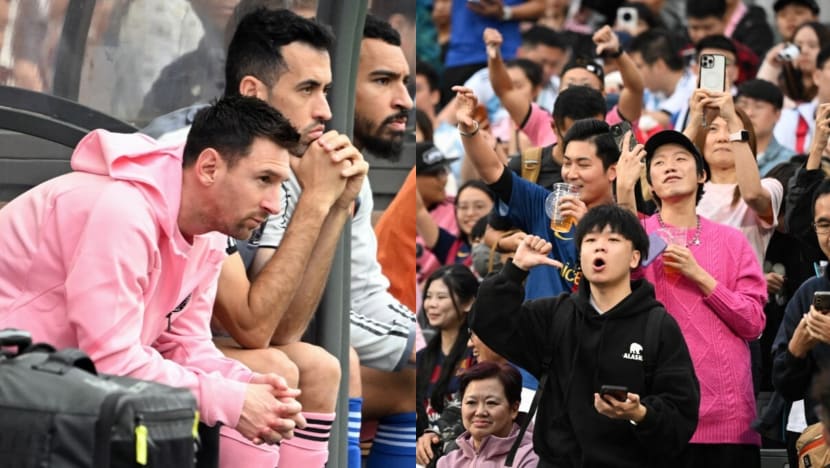Commentary: Has Hong Kong faltered in hosting mega events?
The friendly match that was supposed to star footballer Lionel Messi was not the only event that became a PR crisis for the Hong Kong government, says former journalist Jacky Leung.

Lionel Messi left fans outraged after he remained on the bench during a friendly football match between Inter Miami and a Hong Kong team on February 4, 2024. (Photos: Peter PARKS/AFP)

This audio is generated by an AI tool.
LONDON: Argentine football legend Lionel Messi arrived in Hong Kong on a sunny Friday in early February. The city was cheerfully anticipating the friendly match between his team, Inter Miami, and a Hong Kong team.
At that time, no one could have expected the match to be an international fiasco after Messi failed to play on the field.
Hong Kong had hoped that hosting high-profile events and celebrities would boost its image after the 2019 protests and harsh COVID-19 lockdowns. The government has offered funding for event organisers to stimulate the economy and attract visitors. For instance, the Inter Miami friendly match was promised a HK$16 million (US$2 million) subsidy.
The match was sold out, but the response was disastrous. The audience started booing when they realised that Messi would not play. The news was picked up by international news outlets, which cast Hong Kong in a bad light.
Perhaps pressured by the blowback, Messi addressed the incident in a video posted on Chinese social media platform Weibo. He repeated the reason for his absence given in an earlier press conference - that he had an inflamed adductor.
This is not the only event that has turned into a PR crisis for the Hong Kong government. The city held the FIA World Rallycross Championship for the first time in November 2023. Though the race is not at the same level of Formula 1, it received much hype because the race track was next to Victoria Harbour.
Unfortunately, the event was delayed on its first day as the organisers experienced construction difficulties. The track was also shortened by one-third, making it the shortest leg in the Championship’s season.
THE ABILITY TO ORGANISE MEGA EVENTS
These disappointments make some locals wonder if Hong Kong has lost the ability to organise mega events. There are similarities between the race and the friendly football match - neither organiser had prior experience running events of that scale. Despite that, the government promised to grant them subsidies and left it up to the organisers to pull the event off.
The poor monitoring was shown in the post-match response, in which the government did not have much information about the contract and negotiations between the organiser and Inter Miami.
The government says that Hong Kong will see over 80 mega events in the first six months of 2024. Indeed, not all of them will be chaotic. Still, will events resuscitate Hong Kong’s embattled tourism sector?
Take UK designer Anya Hindmarch's Chubby Hearts art installation in Hong Kong as an example. Funding for the art installation, which saw large heart-shaped balloons pop up in several spots across the city, totalled HK$7.8 million.
The art installation took place across 11 days, starting from Valentine's Day, and attracted decent feedback with photos on social media.
But is it enough to attract tourists to Hong Kong? Probably not.
LEARNING FROM MISTAKES
What Hong Kong needs are events on the scale of Taylor Swift's tour. Her four-day concert in Tokyo earlier this month is estimated to have generated 8.5 billion yen (US$56.5 million) in economic benefits to Japan per show. Only this type of mega event can alleviate Hong Kong’s tourism woes.
Chinese social media is filled with posts about cheap ways to travel in Hong Kong and same-day returns. Hong Kong hotels still have to offer discounts from pre-COVID prices to keep rooms relatively full.
It is challenging for Hong Kong to attract top-tier performers due to the size of its venues. The maximum capacity of Singapore National Stadium, the venue of Taylor Swift's upcoming concerts, is 55,000. While Hong Kong Stadium can accommodate about 40,000 people, it cannot host noisy concerts because of its short distance away from residential estates.
This problem could soon be solved as a new stadium with 50,000 seats and a retractable roof is expected to be opened next year at the site of the former Kai Tak Airport in Kowloon. Nonetheless, the government still needs to change its mentality to succeed.
When asked about how the government would win over superstars like Taylor Swift, Chief Executive John Lee said it was “like asking someone to go on a date” - coming to Hong Kong must align with the artiste’s plans.
But it seems like the Singapore government did more footwork by contacting Swift’s concert promoter, and offering grants that Thai Prime Minister Srettha Thavisin said were in exchange for the singer to perform exclusively in Southeast Asia.
The Hong Kong government seems to rely too much on personal connections to bring events to the city. The Hong Kong Football Association's chairman was reported to have attended multiple events run by the organiser of Messi's match. Anya Hindmarch was a tenant in a shopping mall owned by the chairman of the government fund committee, which granted her the subsidy.
Without scrutiny from the media and the Legislative Council in Hong Kong, it is not easy to thoroughly review the government's approach to organising events.
Undoubtedly, Hong Kong has its advantage as a big city in Asia, but it may not have the best reputation in the eyes of foreigners as they believe Hong Kong is increasingly similar to China.
The backlash of Messi's incident associated with nationalism in Chinese social media may have further strengthened that belief. Organisers and celebrities may skip Hong Kong altogether to avoid potential trouble.
To host events successfully, Hong Kong must learn from its mistakes. It must brush up on its management, marketing and negotiation skills to entice more big names.
Jacky Leung is an award-winning journalist who has worked in multiple Hong Kong TV and radio news stations. He is currently based in London.

















